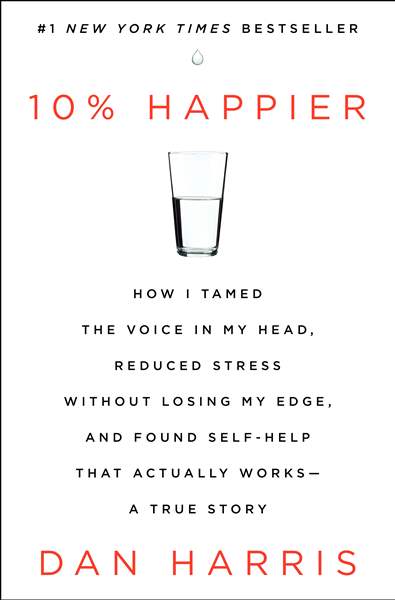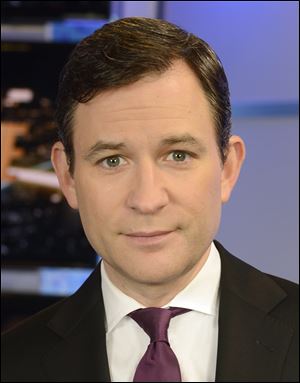
BOOK REVIEW
Author’s work leads him to be ‘10% Happier’
8/16/2014

Dan Harris
Imagine that, with the prestige of your job, you can have contact with just about any spiritual leader in the world. Imagine that the tensions from your work are steering you to seek some spiritual help. Imagine learning about your spirituality by having elite religious figures become your teachers. And imagine that you have a reason to seek a better path.
Dan Harris didn‘t have to imagine. When he was addressing a panic disorder and turning away from destructive behavior, including drug use, he became curious about the benefits of meditation. His job, as a correspondent for ABC News, gave him entree to inspirational people who wrote best-selling books or led religious movements. His mentor Peter Jennings, then the anchor of World News Tonight, had appointed him as ABC's religion reporter; today Harris is one of the anchors of Nightline and cohost of the weekend edition of Good Morning America, as well as a reporter for World News Tonight and other ABC News programs.
Sometimes for his reporting and at other times using story ideas for his own spiritual inquiry, Harris contacted prominent authors and religious leaders and learned their ways. For this religious education, he started with Eckhart Tolle, “an Oprah-approved self-help swami,” then went to Deepak Chopra, “probably the most famous guru on earth,” and later even had an audience with the Dalai Lama, head of Tibetan Buddhism: “Within minutes, he had already proven himself more reasonable than either Eckhart Tolle or Deepak Chopra.”
Harris also found some “Jew-Bu,” or Jewish-Buddhist, authors, psychologist Dr. Mark Epstein and meditation teacher Joseph Goldstein, who continue to provide guidance. “Prior to reading Epstein,” he wrote, “my most substantial interaction with Buddhism was when, as a 15-year-old punk kid, I stole a Buddha statue from a local gardening store and put it in my bedroom because I thought it looked cool.”
As Harris was reading about Buddhist meditation, “The thought popped into my head: Should I try this? … I decided: Damn it, let's give it a shot. Carpe diem, and whatnot.” He followed the book's instructions on how to meditate sitting comfortably, consciously focusing on breathing in and out, and “the biggie. Whenever your attention wanders, just forgive yourself and gently come back to the breath.You don't need to clear the mind of all thinking; that's pretty much imposssible.”
Meditation turned out to be what he needed. “If you'd told me when I first arrived in New York City, to start working in network news, that I'd be using meditation to defang the voice in my head—or that I'd ever write a whole book about it—I would have laughed at you,” he wrote in the preface.

Harris's most important revelation about meditation became the title of his book, 10% Happier, which is partly memoir of life in network news, partly appreciation of the practice of and effects from meditation—with a how-to-meditate appendix. Meditation makes Harris 10 percent happier, he realized. It doesn't completely change you; meditation makes things a little bit more manageable. The little bit for Harris is in the subtitle: “How I Tamed the Voice in My Head, Reduced Stress Without Losing My Edge, and Found Self-Help That Actually Works—A True Story.”
The “10% Happier” phrase “had the dual benefit of being catchy and true,” he wrote, “simultaneously counterprogramming against the overpromising of the self-helpers while also offering an attractive return on investment.”
Harris has been a religion reporter, but he doesn't consider himself to be religious. The Buddhism he took up is not for devout observance; it's meditation-oriented, primarily for personal centeredness, although he’s getting more into mindfulness aspects in his meditating. His Jewish faith was limited to a bar mitzvah in seventh grade, “for social acceptance.” As he put it when Peter Jennings offered him the religion reporting beat, “I tried to issue some sort of a protest about being a devout atheist … but he was having none of it.” Harris didn't even have the conviction of an atheist; in college “I decided … that agnosticism was the only reasonable position, and I hadn't thought about it much since.”
10% Happier is an inspirational book—not in the style of Tolle or Chopra. It's the war stories (one or two of them literal) of a person in a high-pressure job who discovered that meditating made him better—to himself and to others. He's not (directly) seeking enlightenment. This story of Harris' personal journey might inspire others that 10 percent is a good proportion for better living.